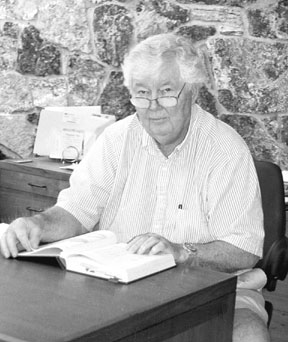For many adult children of World War II veterans whose fathers spoke rarely about their war experiences, a new book written by a Whidbey Island author tells the story their fathers couldn’t.
In a personal account of his experiences in World War II, first-time author and Clinton resident Tucker Giblin has made palpable the smells, sounds, and emotions of that war. It’s an exciting read for anyone, as revealing about the man who wrote it as it is about the realities of war.
Giblin says that it’s now time for the individuals who were there to tell their own stories.
“I wanted this book to be the enlisted man’s story,” said Giblin.
If this is the average man’s account of World War II, then there are a lot of unsung heroes. “Class of ’42” tells of bravery after bravery. Giblin himself carried wounded friends to safety, returning to battle moments later to fight some more, something he did not remember until he was told days later.
A 17-year-old high school student from St. Paul, Minn., Giblin dropped out of school to enlist in the Marines. He was one of many who signed up in 1942 — hence the book’s title.
The volume concentrates on the South Pacific, especially Pelelieu in the British Solomon Islands, Pavuvu, which is now part of Papua, New Guinea, and Okinawa, Japan.
Giblin was first encouraged to write a book because of the vignettes he inserted into the newsletter that his company of Marines used to maintain contact. The stories seemed to take on a life of their own, he said.
Giblin remains in contact with his former company of 135 men who are alive today. By soliciting input through these contacts, plus extensive research, the book took on flesh.
“I got a lot more — four times more — responses and information from these guys than are in the book,” Giblin said.
On review of an early draft, members of his company told him he should tell more about his own experiences.
“They said, ‘Tell us more about Tucker,’ ” Giblin said. ” ‘We want to read more about him.’ And so I added more of my own story as a result.”
One memorable incident tells a story about Lt. Col. Joseph E. Buckley, a highly respected officer who is mentioned in many Marine Corps books written about World War II. Buckley shielded the young Giblin from a court marshal for nicking much-needed socks for himself and his comrades, Giblin wrote.
Then there’s the account of Giblin taking up sewing for his fellow Marines, to tailor standard-sized military clothing to ration-thinned bodies — in exchange for beer.
Giblin also describes the hardships and extreme jungle climate of the South Pacific, as it affected every aspect of the Marines’ daily lives. The book tells of a bone-chilling cold lasting for six months that compared nothing at all to the Minnesota winters Giblin knew, and of a humid, searing heat for the balance of the year. Socks, bedding, underwear, ammunition belts — and more — all rotted in the dampness.
Following the war and schooling at the University of Minnesota, Giblin became a flight purser for Northwest Airlines commercial airlines. After discovering that he loved flying, he became a pilot for Northwest in early 1952. He piloted his last flight in 1985.
For many years, Giblin resisted attending First Marine Division reunions, because of his emotional response to discussions of the bloody battles.
Then there was a breakthrough for Giblin, with the publication of a book by the late E. B. Sledge, “With The Old Breed at Peleliu & Okinawa.” Giblin wrote to thank him for writing “their” story.
” ‘Sledgehammer’ and I exchanged notes and telephone conversations for several years,” Giblin writes in his book. “He convinced me to write about my experiences as a form of therapy. It helped.”
“I hope this book helps others, too,” said Giblin.



